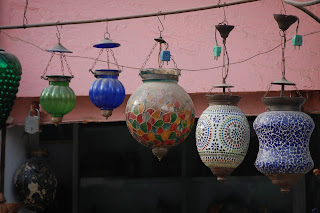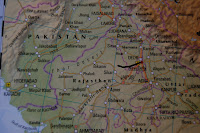In which we turn down two offers to dance
Starring Panchem who can create the most incredible things out of napkins
 From Delhi we caught the train to Churu in Northern Rajasthan - it took about 5 hours Chai filled hours to get there trundling through the parched landscape. Everytime we stopped people would pour into the carriage and grab what seats they could before the conductor arrived and sent them all off to the unreserved seating section. The windows open right up and the door often gets left open so you don't really need the three fans mounted on the ceiling. India's railway is the second largest in the world and employs over 1.5 million people and that's not counting the endless stream of people offering to sell you chai and snacks or the kids that go past sweeping the floor with rags and asking for money. I'm travelling with Intrepid again who are brilliant at providing advice on socially responsible travel - and in this case it's never give to beggars. Easier said than done.
From Delhi we caught the train to Churu in Northern Rajasthan - it took about 5 hours Chai filled hours to get there trundling through the parched landscape. Everytime we stopped people would pour into the carriage and grab what seats they could before the conductor arrived and sent them all off to the unreserved seating section. The windows open right up and the door often gets left open so you don't really need the three fans mounted on the ceiling. India's railway is the second largest in the world and employs over 1.5 million people and that's not counting the endless stream of people offering to sell you chai and snacks or the kids that go past sweeping the floor with rags and asking for money. I'm travelling with Intrepid again who are brilliant at providing advice on socially responsible travel - and in this case it's never give to beggars. Easier said than done.  Many have been converted into hotels and restaurants and the paintings refurbished to their original bright hues. We also got into some that were very much still homes (though not lived in) with family portraits and sofas in the upstairs rooms. The caretakers were usually the ones to take us around leading the way up narrow, low ceilings stairs (a defence mechanism meaning only one person could go up or down at a time - all the better for chopping off enemy heads), unlocking doors and leading the way to the summer rooms on the roof where carved screens have the dual purpose of allowing the wind in and the woman, kept behind doors in strict Purdah, to see out.
Many have been converted into hotels and restaurants and the paintings refurbished to their original bright hues. We also got into some that were very much still homes (though not lived in) with family portraits and sofas in the upstairs rooms. The caretakers were usually the ones to take us around leading the way up narrow, low ceilings stairs (a defence mechanism meaning only one person could go up or down at a time - all the better for chopping off enemy heads), unlocking doors and leading the way to the summer rooms on the roof where carved screens have the dual purpose of allowing the wind in and the woman, kept behind doors in strict Purdah, to see out. The town we stayed in was called Mandawa and is very rural (and consequently conservative) in comparison to Delhi. All the women wear the vibrant saris and most cover their faces. A lot more of the men wear traditional clothing too - baggy white trousers and a long white shirt, often with a turban. The town has one main street lined with shops and fruit carts overlooked by an enormous arch through which a heady mix of buses, camels, pedestrians and motos roar.
The whole area is littered with wells distinguishable by their four minaret like towers that made it possible to spot them from a long way away. They are complex structures with a series of pools built into them each with a different purpose - drinking, washing etc. There are even separate pavilions for the men and women to change in after swimming. Most are dry now as water is collected in storage tanks and delivered or topped up by tanker trucks. There are also little cages all over the town with earthenware pots in that people fill up with water as a charitable act - anyone can come and drink from these. "Except for you!" said our guide Panchem who has been absolutely fastidious about what we eat. We're not allowed to eat anything off the street unless it is peelable which really does narrow things down. And one of the group was already sick so no one was arguing.
 Apparently barely a month goes past in India without a festival. At the moment everyone is gearing up for Holi on the 8th of March which celebrates spring and involves covering one another in paint powder. In one of the Havellis there was a string of cow dung discs hung up in preparation and in the evening a procession made its way down the street trying to drag all he bystanders into the action. We had to decline rather forcefully. It's also very much the wedding season - we saw couples coming for blessings in almost every temple we went into and the one night we watch a wedding procession going past. The groom, very dressed up, was mounted on an extremely patient horse on his way to fetch his bride. He was preceded by a mobile disco complete with flashing lights that was blaring out tunes to a large group of dancing guys. Our participation was once again strongly requested and declined.
Apparently barely a month goes past in India without a festival. At the moment everyone is gearing up for Holi on the 8th of March which celebrates spring and involves covering one another in paint powder. In one of the Havellis there was a string of cow dung discs hung up in preparation and in the evening a procession made its way down the street trying to drag all he bystanders into the action. We had to decline rather forcefully. It's also very much the wedding season - we saw couples coming for blessings in almost every temple we went into and the one night we watch a wedding procession going past. The groom, very dressed up, was mounted on an extremely patient horse on his way to fetch his bride. He was preceded by a mobile disco complete with flashing lights that was blaring out tunes to a large group of dancing guys. Our participation was once again strongly requested and declined. There are also some lovely temples in the area and we went into a series of chatri which had been turned into a furniture factory. They are elaborate turreted memorials now inhabited mostly by pigeons and peacocks who strut about nervously on the turrets.

The nice thing about having a guide is that there is always someone to advise on food. We've tried all sorts of stuff including, eventually some street snacks. Panchem not only deals with the never ending menu related questions but also provides after dinner entertainment in the form if table napkin folding: mainly great buildings of the world - so far we've had Sydney Opera House (two variations) and the leaning tower of Pisa.



No comments:
Post a Comment